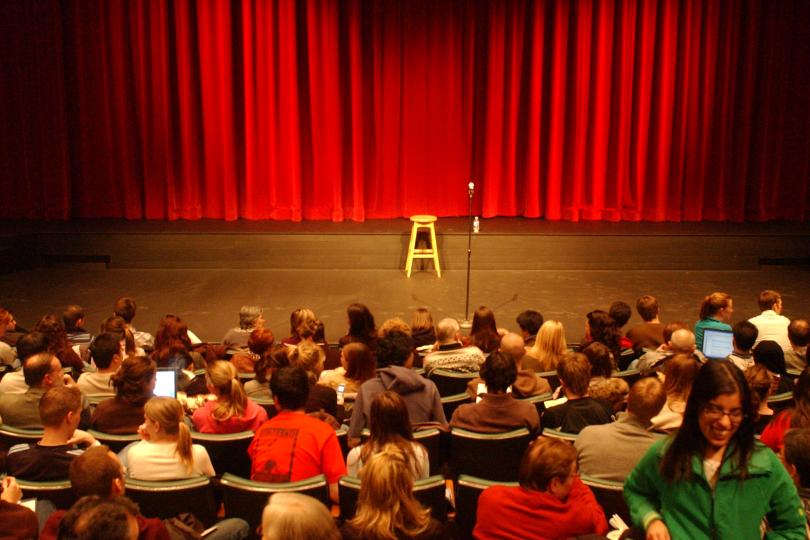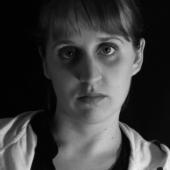Making People Laugh with Pamela Docken

Pamela Docken was one of the owners of Oops Dinner Theater in St. Paul and wrote many of their successful comedies, including a string of Ole and Lena shows. Recently, she's branched into prose with her novel I Died Yesterday. We spoke at a coffee shop in St. Paul.
How did you come to playwriting?
I started doing stand up back in 1989 and I wrote all my material. I did that until I opened the theater in 1999 and after six months in, we realized how much royalties were. So, I, in my complete what's-wrong-with-me said, “I'll write a play!” They're like, hey, do it.
I'd never written anything like that. It's one thing to write jokes as a comic, it's geared toward a persona that I made. I really had no idea what I was getting into. So, I wrote Ole and Lena's Christmas.
Opening night, I wouldn't come to the theater, because if it sucked, I didn't want to see it. We had a sold out show. When I knew how many people were coming, it was like, there's no way in hell I'm going.
I got a call during intermission, saying, “you need to come down here.” That's all they would say.
And when I walked in there, I heard the audience laughing and I started crying.
I called up my second grade teacher. I'm dyslexic and she was the only teacher who took the time to really guide me and teach me how to write. I had her come, and I said, “This is what you did. If not for you, I wouldn't have done this.” It was amazing.
That Christmas show, we ran it every year and we made millions. It was ridiculous. So then I wrote another one. I did a whole series of Ole and Lena plays, and those were the ones that made the money for the theater.
We lost the theater when the city wanted to tear down the building. Once that happened, everything financially went south. So we were officially done in 2007, and I had a couple venues where I did some of my shows. But, I approached the theaters around here, but no one would do them. Theaters outside the Twin Cities would do them. And being that the Twin Cities has so many theaters, it was really disappointing that I'd be getting calls from Wisconsin, North and South Dakota, but nothing from here.
How did you come to the Twin Cities?
I was born here. I am a native. I was born in Vadnais Heights, raised in Mahtomedi. I've never been able to cut the cord from the Twin Cities.
Can you talk a little bit about what it was like to run your own theater and write for yourself?
It was frightening. It was terrifying. There was so much pressure. If it didn't work, not only was it because of the play, it was because of the owner. I had a lot of people depending on me, we had 50 employees during the high season.
There are times, you know, when I was really glad I was doing this. My husband and I were in Hawaii, and a couple comes up to us and asked if we'd take their picture, and I said, “Yeah, sure.” Then they asked where we're from, and I said Minnesota.
They said “I thought you were, by your accent. You have to go to that Oops Theater. Have you heard of it?”
I was like, “Yeah... I've heard of it.”
“We were just there. We saw this Ole and Lena show and it was awesome.”
And I'm like, “Thank you, I wrote it. That's my theater.” The wife told me that she had been diagnosed with cancer and this was kind of their last hurrah trip. I told her that if they ever got back to Minnesota, to give me a call and if they ever wanted to see another show, it'd be on me. And she did.
What's your favorite part of the process of making a play?
My favorite part is when it comes into my head and I can envision something in it and it makes me laugh. And then, I know how it's going to end. That's the exciting part. Once you know the beginning and you know the end, you can do whatever you want to get to that ending. It's fun. All of it is fun. The best part is that when I write, I go to the ocean. I can go in my room and sit all day long in my underwear and talk to myself, and then I stop in time to go watch the sun set over the ocean. Pure heaven. That was my total Pam time. I loved it. I absolutely loved it.
Is there any part of the process that you dread?
I always dreaded opening night. And preview night? Preview night was horrible. Every preview night of every show we had. It was like your baby, you know? I liked watching the show by myself, but if there was an audience, I'd always be looking at the audience.
Do you have a metaphor you use when talking about making a play? Is it like baking a cake or building a house?
It's like doing a triathlon. You can do it, but the obstacles? You're not sure what they're going to be. It's broken up in three parts – the creation and the writing and the revising – and you hit the wall in the middle of the triathlon. If I don't have a deadline, if I don't know where the finish line is, I can lose focus like nobody's business. So, it's like running one of those. I'm a little out of shape these days. I'm not sure that I could run another one, but I'd like to finish one of the ones I've started.
What can theaters do to support new plays? What do new plays need from theaters?
There's a lot of talent in the Twin Cities. If they were to say, we're taking in resident playwrights. Or even, on an off night have someone come in and workshop. That gives the theater a chance to see these guys and what they do, and if they like what they see, they're doing themselves a favor. They're going to save money and they are going to find so much more out there. How many times can you watch A Christmas Carol? It's a good show once.
Why should theater companies do new plays?
It's nice to see a classic, it really is. But the generations change. I know, even my stuff now is geared toward an older generation because it has time behind it. Somebody that's going into a theater now can't relate to what I said. We need younger audiences so we need things that are going to draw them. Unless they're interested in history, the old traditional plays are not going to cut it. Plays are a reflection of our life, of what's going on right now. If theater doesn't produce new, interesting things, it's not going to create an interest in the classics either. The kids in high school that are writing, they need to know that it's worth their time.
Theater offers so much more, or could offer so much more. But it seems stuck. They go with what's been known to work, that's what they're going to stick with. But the audience is changing, and what made money before may not make money now, so take the risk. Give somebody a shot. Give 'em a night a week, watch what they're doing, let 'em workshop it out, don't charge 'em. Writers don't have money! But give them a chance, let them fulfill the dream. And in the end, whether they worked or not, you did something really good.
I feel like there's definitely a fear of what's new, that people aren't going to come see new things. But they aren't going to come see old things either.
No, they're not. And the old generation, the 60 – 75 year olds, that's the new generation. That's when culture changed. They rebelled, they were hippies, they did what they wanted. They're more open to the new because they want stimulation. And they're going to go to the theater if there's something interesting out there. Whereas my parent's generation, they don't want to try anything new. My own kids, they'd see something new before they'd see something old.
We remodel everything else, theater needs an update too. The mindset does. I was also the VP of the National Dinner Theater Association, so I got a lot of input from across the country, and that was the major thing: update your thinking. Open the doors to new ideas. The theaters that had done that, they made tons of money. That was their motivation, they weren't necessarily saying, I want to help out this playwright, but they were willing to look at every playwright who came in the door because they knew that's where it'd start.
Women have a tougher time than men do when it comes to getting attention. Men can do whatever they want, they don't understand that. They can walk into a door and say, I'm John Whoever, I directed twenty thousand plays. It seems to be more acceptable when men embellish themselves versus women trying to just be honest.
What do you see as the future of playwriting?
What I see is that women are going to continue to fight. We're fighting against the known, and we're the unknown. I would love to see doors opened, I would love to see minds open. But I think it's going to be a really slow process. I think it's going to take another generation. And how many are we going to lose before that happens? There's going to be so many who look back and say, I should have given that person a chance.
I would like to see more opportunities, not just for me, but for emerging playwrights, for women playwrights. Let's break this stupid gender barrier. Let's make this work, let's make it real. We want to stay a leader. Because we are! The Twin Cities has more theater seats per capita than anyone else, let's put butts in those seats and make it worth it.




